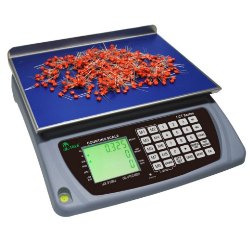We usually get the question how long do scales last about a week after that particular person’s scale has broken. Unfortunately, with so many items being imported from overseas these days and the tremendous pressure on domestic suppliers to suppress extra costs, product quality often suffers.
Weighing scales are a common industrial item that are used to measure the weight of objects. These devices come in a variety of shapes, sizes, and capacities and can be found everywhere from shipping warehouses to hospitals.
While weighing scales are generally reliable and accurate, they do have a limited lifespan and will eventually need to be replaced. In this article, we’ll take a look at how long weighing scales last, as well as some ways to try and increase their lifespan.
How Long do Weighing Scales Last in the Real World?
The lifespan of a weighing scale depends on a number of factors, including the type of scale, the manufacturer, and how well the scale is cared for. Some scales are designed to last for many years, while others may only have a lifespan of a few months or years. Unfortunately, in many instances, the higher priced items generally do last longer. For example, Pennsylvania 7600 50 lb capacity counting scales versus an imported plastic cheap counting scale.
In general, you can expect a good quality digital scale to last for multiple years. However, it’s important to note that the lifespan of a counting scale for example can vary widely depending on how it is used and cared for. A scale that is used frequently or subjected to harsh conditions (such as extreme temperatures or moisture) is likely to wear out faster than a scale that is used infrequently or protected from the elements.

Ways to increase the lifespan of a weighing scale
There are several things you can do to increase the lifespan of your weighing scale and keep it in good working order. Here are a few tips:
-
Use the scale as directed: Be sure to follow the manufacturer’s instructions when using your scale. This includes not exceeding the maximum weight capacity of the scale, as doing so can damage the scale and shorten its lifespan.
-
Protect the scale from the elements: If you’re using your scale outdoors, try to keep it out of direct sunlight and away from extreme temperatures. Protect it from water if possible.
-
Clean the scale regularly: Over time, dirt, dust, and other debris can accumulate on, in, or under your scale, which can interfere with its accuracy and performance. To keep your scale clean and in good working order, be sure to wipe it down regularly with a soft, dry cloth.
-
Handle the scale with care: Avoid dropping or jarring your scale, as this can cause damage to the internal components and shorten its lifespan. If you need to transport your scale, be sure to handle it carefully and use appropriate packing materials to protect it.
-
Replace batteries as needed: If your scale is battery-powered, be sure to replace the batteries as needed. Dead or weak batteries can cause the scale to malfunction or provide inconsistent or inaccurate weight readings.
Answering the question how long do scales last…. really depends on several factors. The type of scale, the manufacturer, and how well the scale is cared for. By following these recommendations, you can help ensure that your scale remains accurate and reliable for as long as possible.